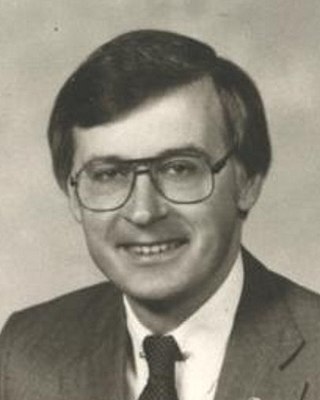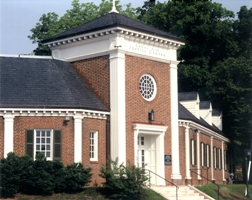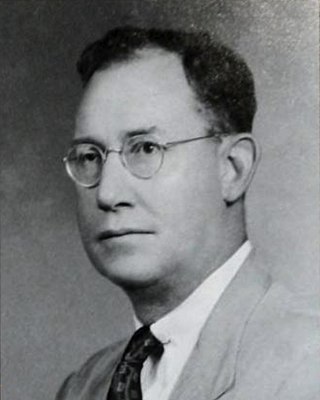Pro bono publico, usually shortened to pro bono, is a Latin phrase for professional work undertaken voluntarily and without payment. The term traditionally referred to provision of legal services by legal professionals for people who are unable to afford them. More recently, the term is used to describe specialist services provided by any professional free of charge to an individual or community.
Legal aid is the provision of assistance to people who are unable to afford legal representation and access to the court system. Legal aid is regarded as central in providing access to justice by ensuring equality before the law, the right to counsel and the right to a fair trial. This article describes the development of legal aid and its principles, primarily as known in Europe, the Commonwealth of Nations and in the United States.

Gerald Lee Baliles was an American lawyer and Democratic politician from the Commonwealth of Virginia whose career spanned great social and technological changes in his native state. The 65th Governor of Virginia, the native of Patrick County previously served as the Commonwealth's attorney general (1982–85), and represented Richmond and Henrico County in the Virginia House of Delegates (1972-1982). After another stint in private legal practice, with Hunton & Williams (1991-2005), Baliles directed the nonpartisan Miller Center of Public Affairs associated with his alma mater, the University of Virginia (2006-2014).

The Virginia Bar Association (VBA) is a voluntary organization of lawyers, judges and law school faculty and students in Virginia, with offices in Richmond, Virginia. Key elements are advocacy, professionalism, service and collegiality. It provides services to its members such as assistance in law office management, promotes or opposes selected state legislation and the administration of justice, and publishes the VBA Journal. It is to be distinguished from the Virginia State Bar, which is the administrative agency of the Supreme Court of Virginia. Virginia is one of three states that has both a statewide voluntary and mandatory bar association.

Oliver White Hill Sr. was an American civil rights attorney from Richmond, Virginia. His work against racial discrimination helped end the doctrine of "separate but equal." He also helped win landmark legal decisions involving equality in pay for black teachers, access to school buses, voting rights, jury selection, and employment protection. He retired in 1998 after practicing law for almost 60 years. Among his numerous awards was the Presidential Medal of Freedom, which U.S. President Bill Clinton awarded him in 1999.

The Association of the Bar of the City of New York, commonly referred to as the New York City Bar Association, founded in 1870, is a voluntary association of lawyers and law students. Since 1896, the organization has been headquartered in a landmark building on 44th Street, between Fifth and Sixth Avenues in Manhattan. Today the City Bar has more than 23,000 members. Its current president, Muhammad U. Faridi, began his two-year term in May 2024.
Morgan, Lewis & Bockius LLP is an American international law firm with approximately 2,200 legal professionals in 31 offices across North America, Europe, Asia, and the Middle East. Mergers with other law firms stimulated global growth and led to a ranking of eighth on The American Lawyer's 2018 top 100 firms by gross revenue list. It is also the largest law firm chaired by a woman and represents "three-quarters of the Fortune 100 companies."
McGuireWoods LLP is a US-based international law firm headquartered in Richmond, Virginia. Initially founded in 1834, the firm has grown into the largest law firm in the state of Virginia, and has 21 offices across the country. Along with its Richmond headquarters, the firm's largest offices are located in Chicago, Illinois and Charlotte, North Carolina.
The City Bar Justice Center provides pro bono legal services to low-income clients throughout New York City. It is part of the Association of the Bar of the City of New York Fund, Inc., a 501(c)(3) corporation.

Michael Signer is an American attorney, author, and politician who served as mayor of Charlottesville, Virginia.
Legal aid in the United States is the provision of assistance to people who are unable to afford legal representation and access to the court system in the United States. In the US, legal aid provisions are different for criminal law and civil law. Criminal legal aid with legal representation is guaranteed to defendants under criminal prosecution who cannot afford to hire an attorney. Civil legal aid is not guaranteed under federal law, but is provided by a variety of public interest law firms and community legal clinics for free or at reduced cost. Other forms of civil legal aid are available through federally-funded legal services, pro bono lawyers, and private volunteers.

The Legal Aid Justice Center is a Virginia based non-profit organization which provides legal services and advocacy to low income individuals. It was founded in 1967 when its Charlottesville office was opened. It has three other offices, in Falls Church, Petersburg, and Richmond.

The Los Angeles County Bar Association (LACBA) is a voluntary bar association with more than 16,000 members throughout Los Angeles County, California, and the world. Founded in 1878, LACBA has strived to meet the professional needs of lawyers, advance the administration of justice, and provide the public with access to justice.
The Jacksonville Area Legal Aid, JALA, developed during the Great Depression and the recession of 1937 out of a group of attorneys who organized to provide pro bono legal services to those who could not afford the services. The Jacksonville Area Legal Aid was officially named in 1973, and received 501(c)(3) tax status in 1976. JALA is a mid-size law firm with over 50 lawyers and support staff who offer free legal services to low income clients in civil legal matters which include public benefits, employment/unemployment law, family law, landlord-tenant disputes, fair housing, guardianship, refugee and asylee immigration, foreclosure defense, and consumer law. JALA works with Florida Coastal School of Law and has supported accredited externships with the Florida State University.
Clarence M. Dunnaville Jr. is an American lawyer and civil rights activist, honored for his career achievements by the Virginia State Bar, as well as by the Library of Virginia.
John Baker Boatwright was Virginia lawyer and member of the Virginia House of Delegates representing Buckingham, Appomattox and Cumberland Counties for 38 years beginning in 1922. A member of the Byrd Organization, Boatwright became a leader of its Massive Resistance to racial integration.

Archibald R. Murray was an American lawyer born in Barbados, who was the first African-American Attorney-in-Chief of The Legal Aid Society, the first African-American President of the New York State Bar Association, and the second African-American Chairman of the Executive Committee of the New York City Bar Association.

Richmond, Virginia, experienced a series of riots in the wake of the murder of George Floyd. Richmond was the first city in the Southeastern United States to see rioting following Floyd's murder. Richmond, formerly the capital of the short-lived Confederate States of America, saw much arson and vandalism to monuments connected with that polity, particularly along Monument Avenue.

Richmond, Virginia, held a general election on November 3, 2020. Voters elected the mayor of Richmond, Virginia, members of the Richmond City Council, and several other local officials. The incumbent, Levar Stoney, who was elected in 2016, ran for reelection, facing five challengers. While local races in Virginia are officially nonpartisan elections, four candidates identified with the Democratic party while Griffin ran as an independent. Stoney won the most votes in six out of nine city council districts, and therefore won reelection. In order to win election, a candidate must receive the most votes in five or more districts.

Eppa Hunton IV was an American lawyer. A native of Richmond, Virginia, he graduated from the University of Virginia and its law school before returning to his hometown, where, excepting his overseas military service in World War II, he resided the remainder of his life. The only son of Eppa Hunton Jr., in 1927 he joined the firm his father co-founded—Hunton, Williams, Anderson & Gay —and practiced corporate law, eventually becoming a senior partner.











